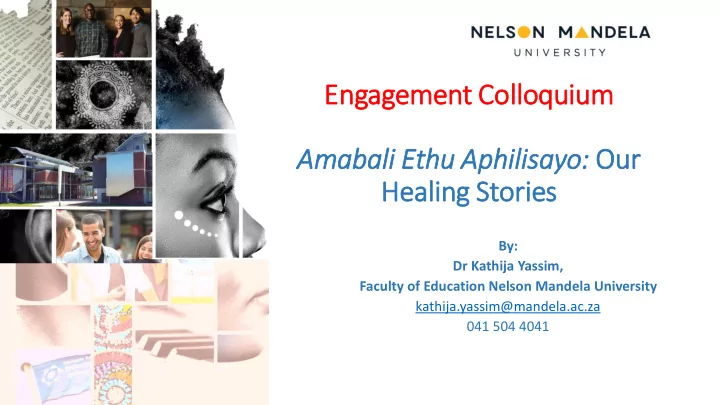

Engagement Col Colloquium Amabali Eth thu Aphilisayo: : Our He Healing Stories By: Dr Kathija Yassim, Faculty of Education Nelson Mandela University kathija.yassim@mandela.ac.za 041 504 4041
Ba Background Amabali Ethu Aphilisayo was born from experimenting with tangible ways to decolonise the university curriculum; The use of “life righting” as pedagogy; and Education for greater good – critical consciousness towards community action.
Ben eneficiarie ies and and Part artners • Teaching partnerships across faculties; • Bringing in community experts like Ms Rayi to work with students; • Undergraduate students in the faculty of education; • Inviting parents and the larger community into our classroom;
#Fee eesMustFall Higher Education in South Africa is racial and class-based – only 15% of the 60% black students who survive first year eventually complete their studies (Le Grange, 2016) Blade Nzimande called for the Africanisation of universities. “Universities, all of them, must shed all of the problematic features of their apartheid and colonial past.” (Higher Education Summit, 2015) “We don’t want to treat the symptoms, we want to decolonise the university – that is the heart of the cause” ( Pambo, 2015)
Decolonisation is not an event but a process… Dei (2000, p.113) argues that: • Bodies of knowledge continually influence each other; • Rendering a false dichotomy is not useful; and that • There is a need to challenge imperial ideologies and colonial relations of production.
Seven ele elements of of de decolonis isatio ion (Smith, 1999 as cited by Chilisa, 2012) 1. Deconstruction and Reconstruction 2. Self-determination and Social Justice 3. Ethics 4. Language 5. Internationalisation of Indigenous Experiences 6. History 7. Critique
Amabali li Eth thu Aphil ilis isayo is s bor born A curriculum pathway with three cycles: - The formation of ancestral sciences (doing community, learning to learn) - Western sciences (learning to unlearn and then re-learn) - Interculturality (from learning to undertaking)
Nine Themes… 1. The place which carries my name in the wind 2. I am not born in Africa, but Africa is born in me 3. Life learning from community intellectuals 4. An African way of being (Ubuntu) 5. Deeply rooted in who I am 6. A child of Africa 7. Knowledge of the soil 8. Towards cultivating humanity 9. Spaces of hope
Our ur Heal ealing Stori ories – A Stor ory Fes estiv ival Video-clip
Out utputs • Development of audio and e-book on a CD - sold for R200.00 each to raise funds for Sodla Sonke – Faculty of Education Student Emergency Fund. • Two conferences – UNISA decoloniality conference (presented in August 2018) & HELTASA (to be presented in November 2018) • Two papers as output: Yassim, K (under review) Amabali ethu Aphilisayo : Decolonising curriculum and praxis through life-righting. Submitted to South African Journal of Education Yassim, K. & Latolla, N. (still being written). Weaving tapestries of knowing: A self- reflexive inquiry on the pedagogy and praxis of teaching life righting. To be submitted to Education as Change.
Next xt Step eps - Widened the circle, by considering a university-wide story festival for 2019; - Multi-disciplinary (multiple art forms to tell stories); - Inviting more partners (other faculties, co-curricular student groups, community groups etc.) - Inviting local authors and storytellers; - Approaching the private sector (publishers, book shops, Dept. of arts and culture); - Producing a story festival website that could be a publishing space; - Various anthologies (short stories, poetry, photographs etc.) - Various story productions – Grahamstown National Arts Festival, Ubuntu Story Festival etc. - Designing a short learning programme for school teachers and community NGOs (based on our learning); - Increasing the research and output footprint – towards a book that participants may contribute to
Tran ans-di disciplinary exchanges & & Ch Chal alleng nges • Teachers should become • Buy-in from gate-keepers in the students more often faculty; • Teach together – learning from • Time constraints; one another • Differing priorities; and • Community intellectuals • Funding
References • Chilisa, B. 2012. Indigenous research methodologies . Los Angeles: Sage publications. • Dei, G. 2000. Rethinking the role of indigenous knowledges in the academy. International Journal of Inclusive Education 4(2): 111‒132. • Grumet, M. R. 1981. Restitution and reconstruction of educational experience: An autobiographical method for curriculum theory. In Rethinking curriculum studies: A radical approach , ed. M. Lawn and L. Barton, 115‒130. London: Croom Helm. • Le Grange, L. 2014. Currere’s active force and the africanisation of the university curriculum. South African Journal of Higher Education 28(4): 1284‒1294. • Nzimande, B. 2015. Speech by Minister Blade Nzimande at the Higher Education Summit held at the Inkosi Albert Luthuli ICC, Durban. http://www.gov.za/speeches/speech- minister-be-nzimande-higher-education-summit-held-inkosi-albert-luthuli-icc-durban (accessed 12 May 2016). • Santos, B. 2014. Epistemologies of the south: Justice against epistemicide . Boulder: Paradigm Publishers.
Recommend
More recommend